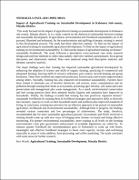| dc.description.abstract | SSEMAKULA PAUL (2011-M092-30013)
Impact of Agricultural Training on Sustainable Development in Kabonera Sub-county, Masaka District.
This study focused on the impact of agricultural training on sustainable development in Kabonera sub-county, Masaka district. It is a study centred on the dialectical relationship between training and sustainable development. If agricultural, environmental and livelihood sustainability are to be pursued, illumined and enhanced, for the transformation and uplifting of people, training is central to this development process. The study had three objectives namely: To find out the impact of agricultural training on sustainable agricultural development; To find out the impact of agricultural training on environmental sustainability; To find out the impact of agricultural training on farmers‟ sustainable livelihoods. The study followed a descriptive cross-sectional case study research design and used four methods to collect data namely: interview method, questionnaire, focus group discussion and observation method. Data were analysed using both descriptive statistics and thematic narrative analysis.
The major findings were that: training has impacted sustainable agricultural development by enhancing the adoption of science and skills of organic farming, practicing of commercial and integrated farming, learning skills of resource utilisation, pest control, records keeping and group formation. These have resulted into improved production, food security and women empowerment among others. Secondly, training has also impacted environmental sustainability. Farmers have been trained to eliminate use of harmful chemicals, soil erosion, water contamination and air pollution through running their farms as ecosystems, practicing agro-forestry, soil, lands and water preservation and management plus waste management. As a result, environmental conservation and fuel saving practices have been adopted; health, hygiene and sanitation have improved in households. Thirdly, the findings revealed that training has also positively impacted farmers‟ sustainable livelihoods by training them in livelihood strategies and innovative skills to diversify into incomes, capacity to work on their household needs and problems plus improved standards of living. In conclusion, training has proved to be an effective approach in the pursuit of sustainable agriculture, livelihoods and environmental sustainability. Although there is progress, the findings revealed various constraints and low percentages of achievement. The study, therefore, recommended that for more sustainable agricultural growth, Government and NGOs involved in training should come up with new ways of bringing most farmers on board and doing effective monitoring. For greater environmental sustainability, more training at all levels on the looming environmental crisis plus government enforcement of available legislations are called for. To enhance greater livelihood the recommendation goes to Parliament to come up with better, meaningful and effective livelihood strategies to boost rural capacity, income and well-being especially in areas of value addition, food processing, and coffee marketing. The study concludes with some areas for further research.
Key Words: Agricultural Training, Sustainable Development, Masaka District. | en_US |


